ABSTRACT The Relationship Among Workplace Learning, Service Quality and Management Performance in Small Businesses : The Mediating Effect of Job Satisfaction Jeong-Hee Choi Dept. of Business Consulting Graduate School, Daejeon University (Supervise...
http://chineseinput.net/에서 pinyin(병음)방식으로 중국어를 변환할 수 있습니다.
변환된 중국어를 복사하여 사용하시면 됩니다.
- 中文 을 입력하시려면 zhongwen을 입력하시고 space를누르시면됩니다.
- 北京 을 입력하시려면 beijing을 입력하시고 space를 누르시면 됩니다.
소상공인의 일터학습과 서비스품질, 경영성과 간의 관계 : 직무만족의 매개효과 = The Relationship Among Workplace Learning, Service Quality and Management Performance in Small Businesses_The Mediating Effect of Job Satisfaction
한글로보기https://www.riss.kr/link?id=T15763549
- 저자
-
발행사항
대전 : 대전대학교 대학원, 2021
-
학위논문사항
학위논문(박사) -- 대전대학교 대학원 , 융합컨설팅학과 기술경영 , 2021. 2
-
발행연도
2021
-
작성언어
한국어
- 주제어
-
발행국(도시)
대전
-
형태사항
139 ; 26 cm
-
일반주기명
지도교수: 현병환
-
UCI식별코드
I804:25002-200000369470
- 소장기관
-
0
상세조회 -
0
다운로드
부가정보
다국어 초록 (Multilingual Abstract)
ABSTRACT
The Relationship Among Workplace Learning, Service Quality and Management Performance in Small Businesses
: The Mediating Effect of Job Satisfaction
Jeong-Hee Choi
Dept. of Business Consulting
Graduate School, Daejeon University
(Supervised by Prof. Byung-Hwan Hyun)
Economic development has brought about knowledge and technology, and this has led to an increase in importance of learning. The forms of learning have made progress for development and potential, and since workplace learning emerged, its studies have been conducted as well. However, we must admit most of the previous works are qualitative studies, and there is an unreasonable lack of quantitative studies. The majority of the existing studies on workplace learning have targeted enterprises, which means there have been few studies targeting small businesses. Therefore, this study aims to analyze workplace learning, which has had a significant influence on businesses. Prior to conducting the study on small businesses, workplace learning, job satisfaction, management performance and service quality were selected as variables, and significances were verified depending on the causal relation of variables. It was found that many small businesses were in poor surroundings. Therefore, this study is focused on helping small businesses develop and reinforce their capabilities. It was thought that there was a need to improve and settle issues regarding self-support by providing small businesses in poor surroundings with an opportunity for workplace learning, which could be the foundation for further growth. Moreover, this study is intended to remind local governments and government agencies of the need for learning, and suggest political and institutional systems. In order to identify and examine the relationship of variables related to workplace learning of small businesses, research hypotheses were) established, based on the previous studies, and empirical analysis was carried out. To verify the hypothesis, this study was conducted as follows. First, workplace was selected as a variable influencing management performance and service quality, and job satisfaction was selected as a mediating effect in the relationship between management_service quality and workplace learning. For this study, 203 small business representatives and workers were surveyed, and for data validation, empirical analysis was performed using SPSS Ver. 24. After collecting 203 questionnaires, frequency analysis was conducted. In addition, factor analysis for analyzing significances of variables, reliability and validity analysis, correlation analysis for analyzing the correlation among variables and demographic analysis were executed. To identify the demographic characteristics and the influence relationship among variables, regression analysis was conducted, and 3-step regression analysis was implemented to inquire into the relationship among simple, multiple and mediating effects. The analysis findings are as follows. Firstly, workplace learning had a partially significant effect on job satisfaction. Secondly, workplace learning had a partially significant effect on service quality, and had a significant positive relationship with management performance. Thirdly, job satisfaction had a significant positive relationship with service quality and management performance. Thirdly, job satisfaction had a significant positive relationship with service quality and management performance. Fourthly, formal learning did not show a mediating effect of job satisfaction in the relationship between service quality and management performance, and informal learning showed a mediating effect of job satisfaction in the relationship between service quality and management performance. As shown in the above analysis results, formal learning was rejected, because it did not have a significant influence on service quality and job satisfaction, and there is a need to figure out the reason for the rejection. It was revealed that small businesses in a poor situation did not receive any chance to experience or be provided with self-learning and formal learning from local governments or government agencies. It is obvious that this loophole is caused by environmental factors of society, economy and politics. Despite these poor environments, small businesses were making constant efforts for their livings. The partial influence of workplace learning, on service quality and management performance implies that small businesses have a life instinct and an empirical will to do their best with their own efforts and experiences and increase sales. Also, the mediating effect of job satisfaction displays a mental state of small businesses. It is expected that finding a way of establishing the mediating effect of job satisfaction in a proper way will help in improving service quality and management performance by stabilizing lives of small businesses. Accordingly, the central government and local governments need to supplement institutional systems for settling issues of small businesses. In spite of these significant research results, this study may have a limitation. For overcoming this limitation, further research will need to target a variety of samples and fields in depth, and the scope of research will have to include practical, academical or political relationships too for enhancing contribution of management performance, service quality and job satisfaction more.
Key Words: Workplace Learning, Service Quality, Management Performance, Job Satisfaction
목차 (Table of Contents)
- 제Ⅰ장. 서 론 1
- 1. 연구의 배경 및 필요성 1
- 2. 우리나라 소상공인의 현황 5
- 1) 지표의 개념 7
- 2) 소상공인 추이 7
- 제Ⅰ장. 서 론 1
- 1. 연구의 배경 및 필요성 1
- 2. 우리나라 소상공인의 현황 5
- 1) 지표의 개념 7
- 2) 소상공인 추이 7
- 3) 시사점 7
- 4) 소상공인 육성에 관한 국가지원 7
- 3. 연구방향 및 목표 9
- 4. 연구방법 및 논문구성 10
- 1) 연구방법 10
- 2) 논문구성 12
- 제Ⅱ장. 이론적 배경 14
- 1. 일터학습 14
- 1) 일터학습의 등장과 배경 14
- 2) 일터학습의 개념 16
- 2. 직무만족 21
- 1) 직무만족의 개념 21
- 2) 직무만족 관련 변인 25
- 3. 서비스품질 25
- 1) 서비스품질의 개념 25
- 2) 서비스품질의 구성요소 27
- 4. 경영성과 30
- 1) 경영성과의 개념 30
- 2) 경영성과의 구성요소 33
- 제Ⅲ장. 연구모형 및 방법 35
- 1. 선행논문의 연구모형 고찰 35
- 2. 연구모형 설정 39
- 3. 연구가설 40
- 1) 일터학습과 직무만족의 관계 40
- 2) 일터학습과 서비스품질의 관계 43
- 3) 일터학습과 경영성과의 관계 46
- 4) 직무만족과 서비스품질의 관계 48
- 5) 직무만족과 경영성과의 관계 51
- 6) 서비스품질과 경영성과의 관계 53
- 7) 일터학습과 서비스품질 간 직무만족의 매개효과 55
- 8) 일터학습과 경영성과 간 직무만족의 매개효과 56
- 제Ⅳ장. 실증분석 60
- 1. 변수의 조작적 정의 60
- 1) 일터학습 60
- 2) 직무만족 61
- 3) 서비스품질 61
- 4) 경영성과 62
- 2. 측정도구 64
- 3. 자료수집 및 분석절차 65
- 1) 자료수집 65
- 2) 분석절차 66
- 4. 연구대상의 인구통계적특성 68
- 5. 측정도구의 타당도와 신뢰도 분석 70
- 1) 탐색적 요인분석 70
- 2) 신뢰도 분석 72
- 제Ⅴ장. 연구결과 75
- 1. 기술통계 75
- 2. 상관분석 76
- 3. 선행논문과 연구자의 분석결과 77
- 4. SPSS 통계분석에 의한 가설검증 79
- 제Ⅵ장. 결 론 91
- 1. 연구결과의 논의 91
- 2. 정책적 시사점 93
- 3. 기여도 및 연구의 가치 102
- 4. 연구의 한계점 및 향후 연구방향 103
- 참 고 문 헌 104
- 영 문 초 록 129
- 부 록 133
- 감사의 글 139










